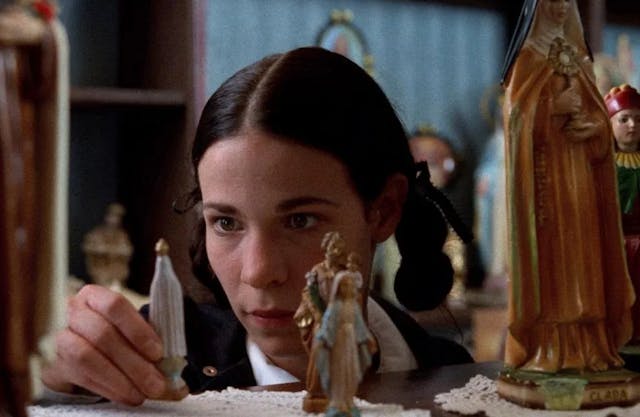So Close, So Far Away: LATAM Can’t Win With the Academy Awards

Pre Office-Hours Blues: Daniel Elías loses Oscar nom, wins at Cinema in "The Delinquents" / Photo courtesy of Magnolia Films.
Fans of foreign film, rejoice! The Academy of Motion Pictures Arts and Sciences published ten shortlists for some categories competing for the 96th Academy Awards in 2024. The Best International Film shortlist is among them, thinning the roster from 88 to 15 candidates.
These are the films that moved on to the next stage:
- “Amerikatsi,” Armenia
- “The Monk and The Gun,” Buthan
- “Perfect Days,” Japan
- “Four Daughters,” Tunisia
- “Totem,” Mexico
- “The Promised Land,” Denmark
- “Fallen Leaves,” Finland
- “The Taste of Things,” France
- “The Teacher’s Lounge,” Germany
- “Godland,” Iceland
- “Io Capitano,” Italy
- “Society of the Snow,” Spain
- “20 Days in Mariupol,” Ukraine
- “The Zone of Interest,” U.K.
Out of those, only five will get a nomination. It is a worthy list of contenders, but we can’t stop feeling a tinge of sadness at the virtual snub that Latin American filmmakers are getting. Out of 12 submissions from countries in the region, only one, Mexico’s “Totem,” made it to the next stage. At least we are well represented. Lila Aviles’ sophomore feature film is a beautiful, hard-hitting family drama with a good chance of scoring a nomination.
Sure, with just 15 spots on the shortlist, worthy movies will not make the cut. But the provenance of the chosen ones raises our Latino eyebrows a bit.
These are the Latin American films snubbed off the shortlist:
- “The Delinquents,” Argentina
- “The Visitor,” Bolivia
- “Pictures of Ghosts,” Brazil
- “The Settlers,” Chile
- “A Male,” Colombia
- “I Have Electric Dreams,” Costa Rica
- “Tito, Margot & Me,” Panama
- “The Last Runaway 2,” Paraguay
- “The Erection of Toribio Bardelli,” Peru
- “Family Album,” Uruguay
- “The Shadow of the Sun,” Venezuela
A Lifetime Romance With the Old World
The first thing that jumps to your attention is how Eurocentric is the shortlist. Nine of the 15 films come from the Old Continent. Three come from Asia and two from Africa. You can say Japan’s “Perfect Days” is European-adjacent, considering celebrated German director Wim Wenders helms the picture. The Art House diet of American audiences partially defines this. Putting aside the quality of the movies, renowned names have a leg up in the competition. Of course, the selecting committee members will jump on recognizable auteurs like Wenders, Aki Kaurismaki, and Matteo Garrone. We do that, too! Once you break into the American market, you belong to the club.

A movie date we'd all want: Alma Poysi and Justi Vataden in Finnish master much-lauded "Fallen Leaves" / Photo courtesy of MUBI.
Insiders Allowed
We get it. We also love those filmmakers. And we have our share of stars in that club. There's the "Three Amigos" from Mexico: Alfonso Cuarón, Alejandro González Iñárritu and Guillermo del Toro. To varying degrees, they have been absorbed by the Hollywood industry. At the same time, the two first went back home with "Roma" (2018) and "Bardo: False Chronicles of a Handful of Truths" (2022). Cuarón won his second Oscar for Best Director thanks to his beautiful Mexico City-set memory piece - but it's so rare that black and white movies strike gold nowadays -.

Win by remembrance: Alfonso Cuarón and his three Oscars for "Roma" / Photo courtesy of Dreamstime.
Besides, the Academy likes them better working in the Queen’s English. Del Toro won Best Picture and Best Director with his revisionist monster romance “The Shape of Water” (2018), fueled by pure nostalgia for ’50 American sci-fi. He has a single purely Mexican movie, his feature film debut “Cronos” (1992). His gothic marvels “The Devils’ Backbone” (2001) and “Pan’s Labyrinth” (2006) are quintessentially Spanish horror.
Artists should not have frontiers. It’s great to see Latin American talent crossing borders and making movies that can be seen worldwide, helped by the Hollywood infrastructure and the traditional exhibition model. International theatrical distributors are more keen to program, say, Del Toro’s star-studded “Pacific Rim” (2013), with Idris Elba when Hollywood was trying to make him into a blockbuster star, than his indie, Mexico-set vampire movie with Argentinian actor Federico Luppi in the lead role. He is one of Argentina’s best actors, but he does fill seats in China. This is why an Oscar nomination matters for up-and-coming talent from Latin America. This distinction whips up interest and opens markets for them. It’s the best calling card, next to a big Film Festival award.

Guys, really...leave something for the others: Iñarritu and his 3 Oscars for "Birdman" / Photo courtesy of Dreamstime.
The Film Festival Advantage
Ubiquitousness helps. That is why movies programmed in the highest-profile international film festivals have an advantage, especially the big five: Cannes, Sundance, Berlin, Venice, and Toronto. It’s even better if they get an award. Out of the 15 in the shortlist, 12 received accolades at these events.
Sure, our Latam candidates have infiltrated the festival circuit, even snatching a bauble or two. But it seems to matter less when building their case in front of the Academy. “The Delinquents,” “Pictures of Ghosts,” and “A Male” scored nominations at Cannes. “The Settlers” won the FIPRESCI award at the Un Certain Regard sidebar. “ I Have Electric Dreams” conquered three awards at Locarno. Bear in mind these are not flash-in-a-pan flicks. They have collected sterling reviews, but it did not make any difference in the long run.
On The Home Front
The road has been fraught since the beginning. How do you pick up a single film to represent a whole country? The Academy gives plenty of freedom to local cultural authorities - as it should be. Still, it’s a thankless task, especially for countries with more developed industries, and an embarrassment of riches from which to pick and choose. This year, Argentina had a worthy candidate in “The Delinquents.” Rodrigo Moreno’s playful anti-heist film was a delightful wonder, bringing to mind both noir films and Jacques Rivette. I love it. You can read our interview with Moreno, which was timed for the movie’s theatrical release earlier this year. It’s currently available to stream on MUBI, and you should watch it. No self-respecting movie buff should miss it.

After the heist: Laura Paredes, Germán De Silva, Esteban Bigliardi y el resto del staff in "The Delinquents" / Photo courtesy of Magnolia Pictures.
It so happens that another Argentinian movie is making waves. Laura Citarella’s “Trenque Lauquen: Part 1” is a sprawling 4 hours and 22 minutes mystery starring the wonderful Laura Paredes. It was selected by France’s influential magazine Cahiers du Cinema as the best movie of 2023. Was Argentina mistaken? Not really. How the hell can one decide what’s best? Films are like apples and oranges.
How I Learned to Stop Worrying and Loved the Nominations
There is a dirty secret behind every award invented by humankind. You can measure performance in sporting events, but determining what is “best” in art is a whimsical endeavor. It’s only as accurate and important as we deem it. So, take the Oscar with a massive grain of salt. Or better, year, a full sack of it. Everything is conditioned by factors beyond artistic merit: capitalism, colonialism, racism, commerce, cultural and geographical proximity. You name it, it’s at play. When Sight & Sound revealed its latest Critics’ Poll of the Best Films of All Time, we decried the poor representation of Latin American Cinema.
I find solace in the work we and many other critics and outlets do of highlighting new, exciting filmmakers from Latin America and every other underrepresented country. Out of the crop of Oscar candidates, we were lucky enough to talk with Moreno. Colombia’s Fabián Hernández returned to the mean streets where he grew up to deconstruct masculinity in “A Male.” Perú’s Adrián Saba gave us a daring family comedy with “The Erection of Toribio Bardelli.” Miguel Ángel Ferrer offered a “CODA”-like crowdpleaser with “The Shadow of the Sun.” They might not get an Oscar, but that does not change their essence in the big scheme of things. You never know what will work. “20 Days in Mariupol” made both the International Film and the Documentary shortlists. Marija Kavtaradze’s lovely “Slow,” from Lithuania, won the Directing Award in the World Cinema Dramatic competition at 2023 Sundance and did not make it on the shortlist. What gives? Forget it, Jake. It’s the Oscars.
Watch “Lonely”
“Lonely” is a powerful reminder that no one is ever truly alone, and there is always someone out there who cares and wants to help.
Stream NowWant to get an email when we publish new content?
Subscribe today




























